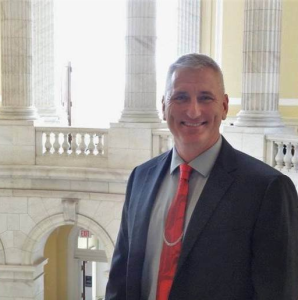Alumnus presents his research of Native-American Lumbee People

At Union Institute & University’s July 2015 Ph.D. residency, alumnus Dr. Eric Hannel (Ph.D. 2014) presented his research regarding the Native-American Lumbee people. Social justice presentations, like this, are one of the key highlights of every doctoral residency.
Dr. Hannel’s lecture focused on recognizing the “other sides” of the American colonial narrative by examining Native American perspectives and histories. His concerns for social justice and responsibility originally fueled his curiosity about the Lumbee people of North Carolina. He emphasized the importance of the Lumbee’s use of sacred histories to define themselves as a people, in contrast to racialized, pseudo-scientific, Western models that have been used to discriminate against them.
Social justice and equal recognition of all humanity are driving, motivating forces for Dr. Hannel—which he connects to the larger Native American heritage. “To me, social responsibility requires that my efforts focus on solving problems impacting the larger community,” he said. “According to a Lakota Native American prayer, Mitákuye Oyásʼiŋ (meaning “we are all connected”), what happens to one of us (individual, group, society) happens to all of us. We have a symbiotic relationship with each other and the world around us; therefore, we must work together to address the challenges we all face.”
Dr. Hannel feels a sense of responsibility to the larger community in education, politics, and policy-making. Enacting and implementing change in society for Dr. Hannel begins with raising awareness and starting a dialogue among invested parties. “From an academic perspective, I try to perform my social responsibility by identifying problems (some previously known and long forgotten by society) and creating awareness through writing and public speaking. It is my goal that awareness will lead to discussion, and discussion will lead to solutions.”
Discussion is part of the solution, but the next step is to implement the ideas that grow from that discussion. “To me, social responsibility must be as much about action as it is about discussion. To that end, I am now enrolled in a law school that allows me to focus on Indian law so that I can expand my arguments in new and exciting ways.”
Public policy and practice regarding the advocacy of United States Veterans is also a major concern for Dr. Hannel. “From an occupational perspective, I try to perform my social responsibility by investigating problems within a department of the federal government, by conducting public hearings to discuss the problem and possible solutions, by crafting legislation that addresses shortcomings and when necessary. In some cases, they become law.”
Dr. Hannel earned his Ph.D. with concentrations in Public Policy & Social Change and Humanities & Culture from Union Institute & University in 2014. He is currently the Staff Director of the Subcommittee on Oversight and Investigations for the House Committee on Veteran Affairs in Washington, D.C. and he served for more than twenty years in the United States Marine Corps. “My involvement with Veterans came naturally as an extension of my years in the Marine Corps and the generations of family members who have served,” he said.
He is currently working with Lexington Press to publish his book Reinterpreting a Native American Identity: Examining the Lumbee through the Peoplehood Model. In addition, he has publications forthcoming in the Journal of Military Experience (2015), Gary Bloomfield’s Alive Day (2015), and an entry in The SAGE Encyclopedia of War: Sociological Perspectives (2016).